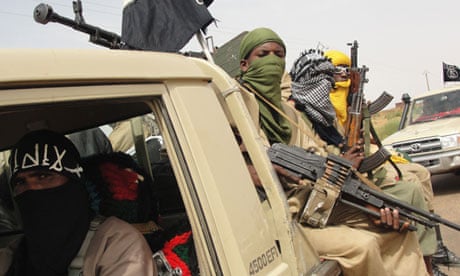The "shocking" state of the Nigerian army has delayed plans for a military intervention in Mali, amid reports that it lacks the capability to fight on the frontline.
A senior source in Mali told the Guardian that a lack of training and discipline among Nigerian troops – who are being heavily relied on by regional bloc Ecowas to oust Islamists in control of northern Mali – is becoming increasingly apparent.
"The Nigerian army is in a shocking state," said the source, who has seen recent assessments of Ecowas's military capability. "In reality there is no way they are capable of forward operations in Mali – their role is more likely to be limited to manning checkpoints and loading trucks."
"The Nigerian forces lack training and kit, so they simply don't have the capability to carry out even basic military manoeuvres," the source added. "They have poor discipline and support. They are more likely to play a behind-the-scenes role in logistics and providing security."
News about the low capacity of Ecowas troops adds increasing pressure on the Malian army, whose lack of training and equipment led directly to the country's 22 March coup d'etat, which toppled the previous civilian government and allowed al-Qaida-linked Islamists to gain control of the country's north.
Under plans for a UN security council-backed military intervention in Mali, now being drawn up by the Malian government with Ecowas and the African Union, as well as the EU and US, the country's military is expected to lead forward operations.
France, Germany, the US and the EU have all backed plans to provide the Mali army with training, equipment and logistics support.
"The Malian army should play a substantial part in any ground operation, following their training by the EU," said the source. "Once the security council gets the report it asked for, in mid to late November, the planning and co-ordination can really begin in earnest."
A spokesperson for the Nigerian national security agencies admitted that the army was suffering from a lack of resources, but said it had achieved success in previous military interventions.
"The situation is that Nigeria has the trained personnel, what we require however is additional funding and logistic support," said the spokesperson. "We are working toward a coordinated approach that at the international level includes the UN, the EU and France, as well as our regional partners."
"Nigeria has a lot of past experience in successful military and diplomatic interventions on the continent."
Questions about the capability of Ecowas military forces come amid reports that a senior Malian government official has been conducting talks with a delegation from the Islamist extremist group Ansar Dine – the largest of the al-Qaida-linked factions that have control of the Kidal region of northern Mali – in Burkina Faso's capital, Ouagadougou, with President Blaise Compaore. Ansar Dine is under pressure to break links with al-Qaida in the Islamic Maghreb, although some experts believe there is little to distinguish the groups, which say their goal is to impose sharia law in Mali and the whole west African subregion.
In a recent interview with the Guardian, a senior figure from Movement for Tawhid and Jihad in West Africa – which controls the Gao and northern Mopti regions of Mali – said it would not negotiate with any group that did not accept sharia.
Political and diplomatic figures involved in drawing up plans for a military intervention in northern Mali have said over recent weeks that the use of force seems "unavoidable" and is likely to commence in the new year.
